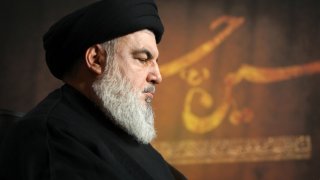What Will Hezbollah Do Next?
Following Nasrallah’s rhetoric, it seems the Lebanese people should brace themselves. A response from Hezbollah is inevitable.
Beirut—In a recent interview with CNN, Lebanese caretaker Foreign Minister Abdallah Bou Habib made a stunning concession that his government cannot control Hezbollah’s decision to enter further hostilities with Israel.
“It’s not like we can order them. We’re not claiming that, but we can convince them, and I think it is working in this direction,” Bou Habib said.
The foreign minister’s interview took place during his visit to Washington, a visit intended to ask the White House to apply more pressure on Israel to proceed with caution in Lebanon. Yet, it was a line that revealed further surrender to the reality: Hezbollah, not Lebanon’s legitimate government, decides the rules of retaliation. A party member of Parliament, Nadim Gemayel, told the National Interest, “What Bou Habib is saying is a declaration that officially accepts the de facto situation.”
The January 2 drone attack into the Hezbollah-controlled Beirut southern suburb of Dahieh that killed Hamas deputy Saleh al-Arouri, along with six others, brought the war closer to home for the Lebanese people. Israel denied responsibility for the assassinations. Yet, many suspect that Tel Aviv was behind it and are waiting to see how Hezbollah and Hamas will retaliate. By not claiming it was behind the killing of Arouri, the Israelis could accuse Hezbollah of escalating tensions depending on its response.
Tens of thousands on both sides of the border have already fled their homes for fear of Israeli air raids and Hezbollah missile and artillery fire. Hezbollah claims it is fighting the Israelis in support of the Palestinian people. Yet, its constituency lives in Lebanon—most of whom live in south Lebanon and the Dahieh area. If a full-scale war were to break out, they would be the first to feel it.
But they will not be the last. In a speech given on Friday by Hezbollah’s Secretary-General Hassan Nasrallah—he warned that his group cannot remain silent in the wake of Arouri’s killing and laid out the possible consequences.
“This means that all of Lebanon will become exposed, all cities, villages, and figures will become exposed.”
“The murder of al-Arouri…will certainly not go without reaction and punishment,” he added. This is what many have feared for some time now—a new war that could lead to devastating destruction of life and infrastructure, making the 2006 war look like a skirmish.
In an interview with the National Interest, Professor Nadim Shehadi, who formerly headed the Middle East program at Chatham House in London, shared his views on the situation:
“We are in a war of posturing and propaganda. Someone is bluffing and taking a lot of risks. I feel that if Nasrallah is not bluffing, he is going to send the country to its destruction. He says that he has over 100,000 fighters and 150,000 missiles. If the Israelis believe him then it could constitute a deterrent. But, if it turns out he is bluffing, and he doesn’t have these weapons and fighters—then he will be dragging the country into a very destructive war that would be very difficult to re-emerge from.”
Shehadi also emphasized that Lebanon’s current situation is far more precarious than in the summer of 2006 when Israel and Hezbollah fought a month-long war. Once the war ended, the Gulf states and the international community stepped in to help rebuild Lebanon. Now, at a minimum, Gulf monarchies like Saudi Arabia and Kuwait are not showing signs they will make the same contributions to the Lebanese economy.
“In those days, we had international support. From the United States and Gulf countries. Now, we are completely isolated. So, if we go to war, it will be very difficult to go back.”
Following Nasrallah’s rhetoric, it seems the Lebanese people should brace themselves. Israel crossed a line of the old rules of engagement—despite its official denial. A response from Hezbollah is inevitable. Otherwise, Hezbollah will be seen as hesitant and giving into fear in the eyes of the enemy. However, the chance of retaliation turning into a full-scale war like Gaza is still low. Most likely, it will be a “proportional” response. Whatever shape it takes, one can never be sure. Yet, when it does happen, no one should be surprised. Now, we wait.
Adnan Nasser is an independent foreign policy analyst and journalist with a focus on Middle Eastern affairs. Follow him on Twitter @Adnansoutlook29.
Image: Shutterstock.com.

